Abancourt, Oise
Abancourt (French pronunciation: [abɑ̃kuʁ] ⓘ) is a commune in the Oise department in the Hauts-de-France region of northern France.[3]
Abancourt | |
|---|---|
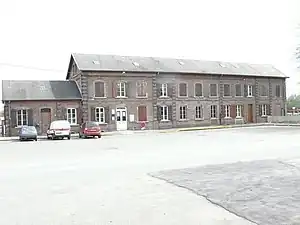 Abancourt Railway Station 2008 | |
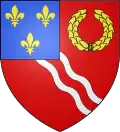 Coat of arms | |
Location of Abancourt | |
 Abancourt 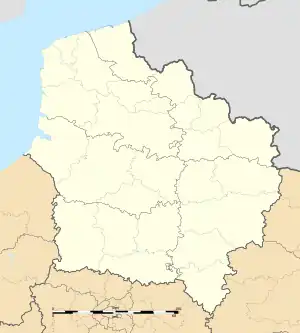 Abancourt | |
| Coordinates: 49°41′52″N 1°45′57″E | |
| Country | France |
| Region | Hauts-de-France |
| Department | Oise |
| Arrondissement | Beauvais |
| Canton | Grandvilliers |
| Intercommunality | Picardie Verte |
| Government | |
| • Mayor (2020–2026) | Jean-Louis Dor[1] |
| Area 1 | 6.01 km2 (2.32 sq mi) |
| Population | 606 |
| • Density | 100/km2 (260/sq mi) |
| Demonym(s) | Abancourtois, Abancourtoises |
| Time zone | UTC+01:00 (CET) |
| • Summer (DST) | UTC+02:00 (CEST) |
| INSEE/Postal code | 60001 /60220 |
| Elevation | 170–222 m (558–728 ft) |
| 1 French Land Register data, which excludes lakes, ponds, glaciers > 1 km2 (0.386 sq mi or 247 acres) and river estuaries. | |
The inhabitants of the commune are known as Abancourtois (masculine) or Abancourtoises (feminine).[4]
Geography
Abancourt is located some 40 km south-west of Amiens and some 20 km north-east of Forges-les-Eaux in the western extremity of the Oise department, on the border of the Seine-Maritime department. Access to the commune is by the D316 road from Aumale in the north passing through the commune and the village and continuing south to Blargies. The D8 goes south-west from the village to the border of Seine-Maritime where it becomes the D236 and continues south-west to Criquiers. The D7 branches off the D316 south of the village and goes south-west to Moliens. The D919 goes north-east from the village to Romescamps. Apart from the village there are the hamlets of La Montagne in the north and Hennicourt in the south. Except for a strip of forest in the west, the commune is entirely farmland.[5][6]
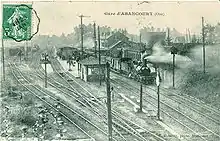
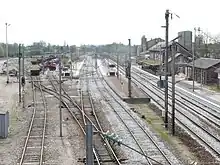
A railway line passes through the east of the commune from north-east to south with Abancourt station in the south of the commune. The station is an intermediate stop on the TER Hauts-de-France Amiens to Rouen route[7] and the Le Tréport-Mers to Beauvais route[8]
The river Bresle flows north-west from Abancourt along the Formerie plateau into the English Channel at Le Tréport. This coastal river is around 68 to 72 kilometres long depending on which source is used[9] and crosses the Oise, Somme, and Seine-Maritime Departments.
Neighbouring communes
Toponymy
The area was mentioned as Abencourt in 1146, Abencurtis in 1148, Abencurt in 1150 and 1152, Habencourt in 1180, Abencourt in 1337, 1454, and in the 16th century.
One Jean and one Adrien d'Abancourt were alternately lords of Abancourt at the beginning of the 15th century.
History
Roman period
Ceramic tiles and amphoras from Abancourt's Roman period are displayed in the Beauvais museum. These were found near a hamlet on the mountain and it is assumed that there must have been a Roman camp or installation at one time. Fine red pottery, stepped and curved roof tiles nearly 50 centimetres across have been found.
On Abancourt's ancient Roman road lies a linden tree 6 metres in circumference, which was possibly the marker of a military border or a Celtic monument.[10]
Recent history

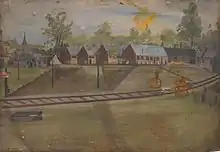
Abancourt appears as Abancourt on the 1750 Cassini Map[11] and the same on the 1790 version.[12]
The village was renamed Abancourt-la-Montagne after the French Revolution.[13] Between 1791 and 1823, the commune was reattached to Romescamps. In 1823 Abancourt was newly created as a commune from Blargies with Hennicourt added to it.[14]
In 1867 the railway came to Abancourt with the construction of Abancourt Station on the Rouen to Amiens line. It was connected directly to Le Tréport and Paris in 1873–1875.
In the First World War the main British supply ports of Le Havre and the inland port of Rouen had restricted hinterlands. It was necessary to find a location where the daily supplies, to maintain 1.3 million troops, could be marshalled and distributed. Abancourt, the junction of several key railway lines to the coast and the Somme, was chosen. Supply trains from Le Havre and Rouen disgorged their content into vast warehouses in the Abancourt complex along 3.2 kilometres (2.0 mi) of track. The warehouses contained enough non-perishable stores to last at least one month and dispatched twenty-two supply trains a day to the next distribution station. Today there is no obvious trace of this vast complex of warehouses and sidings.[15]
In the First World War, the British Army had a prison at Abancourt. In August 1916 a serious mutiny broke out in the prison, for which seven ring-leaders were prosecuted and at least two put to death on 29 October 1916: British Gunner Lewis, aged 30, shot at Rouen,[16] and New Zealand Private John (Jack) Braithwaite, 35 years old, shot at the prison.[17]
World War II
See
Heraldry
 Arms of Abancourt |
Blazon: Gules, 2 bends wavy argent, in chief a laurel crown Or, and on a canton azure 3 fleurs-de-lys Or.
|
Administration
Mayors
| From | To | Name[18] | Party | Position |
|---|---|---|---|---|
| 1962 | Paul Rouvier | |||
| 1989 | 2001 | Nicole Lefevre | ||
| 2001 | 2008 | Emmanual Potvin | DVG | |
| 2008 | Current | Jean-Louis Dor | LC | Retired |
Intercommunality
Abancourt is a member of the Community of communes of Picardie Vert,[19] which comprises the communes of Formerie, Grandvilliers, Marseille-en-Beauvaisis, and Songeons.
The commune is part of "Greater Beauvaisis", one of the sixteen constituent departments of the "Region of Hauts-de-France".
The commune participates in three inter-communal groups:
Budget and fiscalism
The principal 2006 municipal budget allocated 298,000 euros to investment and 217,000 euros to services.[20]
In 2010, the poll tax (TH) collected by the commune was 3.40%, the property tax on developed properties was 22.29%, the property tax on vacant land was 21.71%, and the business tax (TP) was 11.93%.[21]
Population
|
| |||||||||||||||||||||||||||||||||||||||||||||||||||||||||||||||||||||||||||||||||||||||||||||||||||||||||||||||||||||||||||||||||||||||
| Source: EHESS[23] and INSEE[24][25] | ||||||||||||||||||||||||||||||||||||||||||||||||||||||||||||||||||||||||||||||||||||||||||||||||||||||||||||||||||||||||||||||||||||||||
Distribution of population by age
| Abancourt | Oise | |||
|---|---|---|---|---|
| Age Range | Men | Women | Men | Women |
| 0 to 14 Years | 22.3 | 21.5 | 21.0 | 19.5 |
| 15 to 29 Years | 16.0 | 17.1 | 18.0 | 16.7 |
| 30 to 44 Years | 19.7 | 17.5 | 19.7 | 19.6 |
| 45 to 59 Years | 19.7 | 18.0 | 20.8 | 20.1 |
| 60 to 74 Years | 17.7 | 19.5 | 14.8 | 15.4 |
| 75 to 89 Years | 4.7 | 4.9 | 5.2 | 7.5 |
| 90 Years+ | 0.0 | 1.5 | 0.4 | 1.2 |
Sites and monuments
Facilities and services
Education
The commune has two schools – an elementary school at Abancourt and a primary school at Hennicourt.[29]
Shops and services
In 2008, the town also had a bar/tobacconist, a bakery and a grocery store, located on the Main Street.
At the railway station there is a hotel, restaurant and a bar/tobacconist.
A hall is also available for hire.
Notable people linked to the commune
- In the early 1960s, the singer Annie "Stone" Gautrat, who sang with Eric Charden, lived in a small house in Perny Street, near the railway station, with her parents during her childhood. The house is located at the corner of the street at the bridge. Stone still remembers the white portico which was present at the time.
- Patrick Jakobowsky wrote the lyrics of the song "Made in Normandy".
See also
Notes and references
Notes
References
- "Répertoire national des élus: les maires" (in French). data.gouv.fr, Plateforme ouverte des données publiques françaises. 13 September 2022.
- "Populations légales 2020". The National Institute of Statistics and Economic Studies. 29 December 2022.
- INSEE commune file
- Inhabitants of Oise (in French)
- Abancourt on Google Maps
- Abancourt on the Géoportail from National Geographic Institute (IGN) website (in French)
- TER Amiens to Rouen Timetable (in French)
- Le Treport-Mers to Beauvais Timetable (in French)
- 68.1 km according to Sandre. "Fiche cours d'eau - La Bresle (G01-0400)"., 71 km according to the EPTB of Aumale website, 72 km according to le Petit Larousse, the Encarta encyclopedia, and Pierre-Jean Thumerelle in his article dedicated to the river.
- Source: Archaeological records on the Oise department, Academic Society of Archaeology, Sciences, and Arts of Oise, Emmanuel Woillez, 1862.
- Abancourt on the 1750 Cassini Map
- Abancourt on the 1790 Cassini Map
- Revolutionary Names of Communes, p. 47 (in French)
- "Communes Letter" (PDF). Archived from the original (PDF) on 21 November 2008. Retrieved 4 August 2009.
- Hooper, Colette, Railways of the Great War, Bantam Press, London, 2014, p.128
- Dr. David Payne, Why the British Army did not Mutiny En Masse on the Western Front in the Great War Archived May 5, 2014, at the Wayback Machine, 2008
- Braithwaite, John Biography, Ian McGibbon, Dictionary of New Zealand Biography, Vol. 3, 1996
- Mayors of France (in French)
- Picardie Vert website Archived February 21, 2010, at the Wayback Machine (in French)
- Ministry of Economy and Finance: Individual accounts for communes (Municipal budgets 2001 to 2006) Archived 2012-07-01 at archive.today (in French)
- Local Taxes at taxe.com
- Abancourt on INSEE (in French)
- Des villages de Cassini aux communes d'aujourd'hui: Commune data sheet Abancourt, EHESS (in French).
- Évolution et structure de la population en 2017: Commune d'Abancourt (60001)
- Historique des populations légales
- Évolution et structure de la population en 2017: Département de l'Oise (60)
- Ministry of Culture, Palissy PM60000001 Group Sculpture: Education of the Virgin (in French)
- Abancourt (Hénnicourt): End of work – the chapel begins a new life, 17 July 2008, Published in Le Réveil Bresle-Oise-Somme edition ISSN 0832-3941
- List of primary schools for Abancourt (in French)